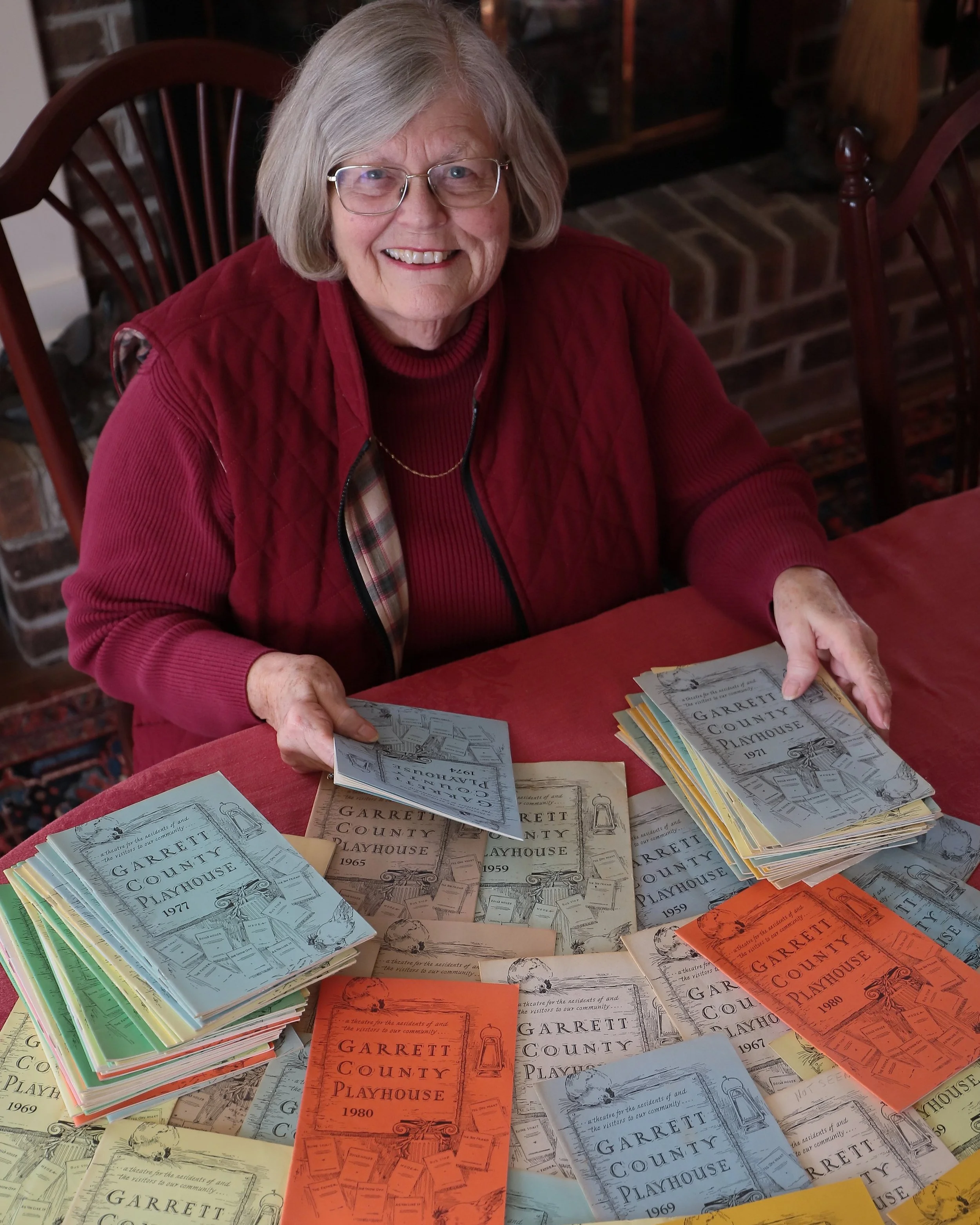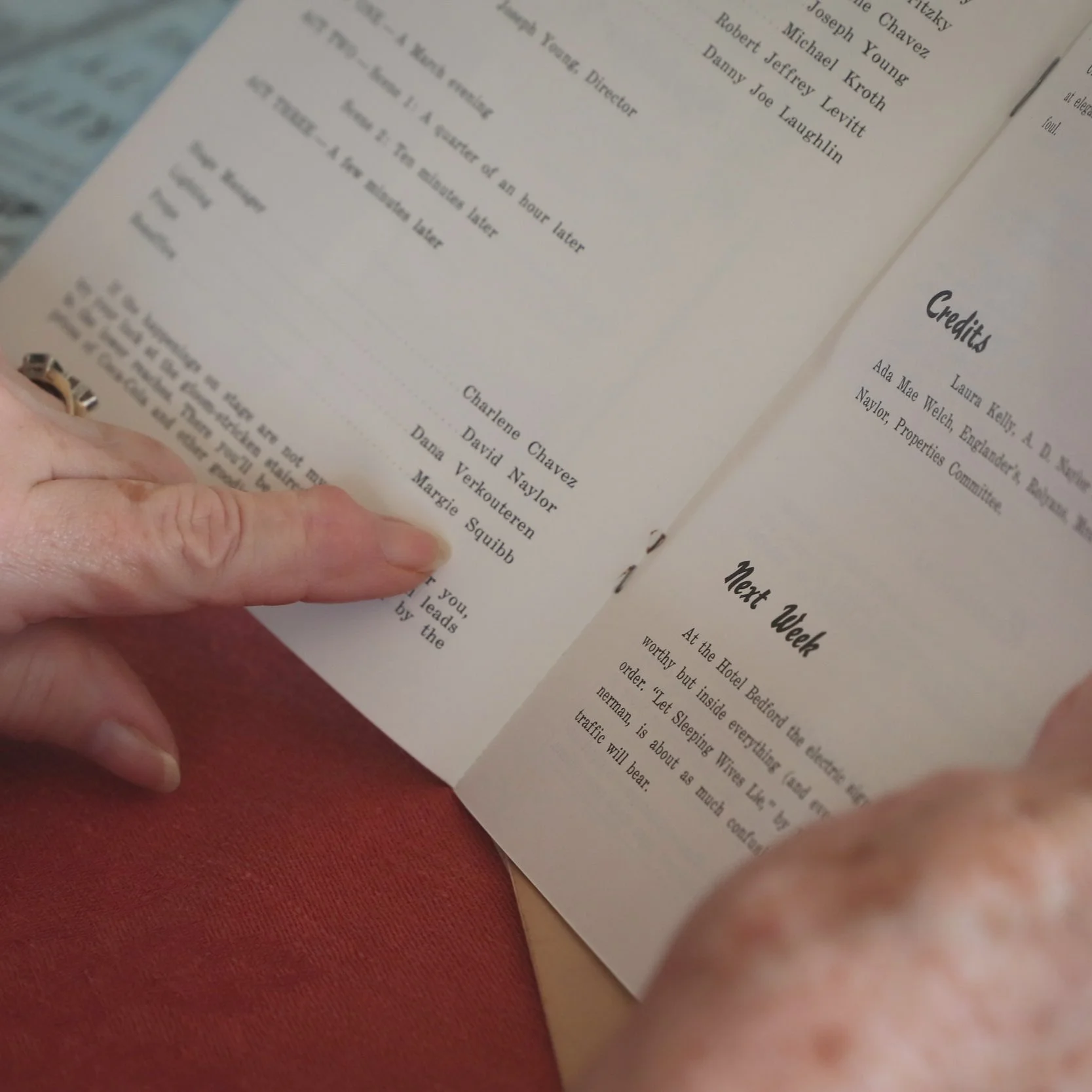DCL 100 Honors Garrett County Playhouse
Mountain Lake Park resident Kathie Smith reviews playbills from the long run of the Garrett County Playhouse, a summer stock theater that produced eight plays each summer from 1955 to 1984.
Contributed by Len Shindel
Most of the celebration of Deep Creek Lake’s 100th-year anniversary will take place in the Lake District. But a popular piece of lake-area history is coming in July to Victorian Chautauqua in Mountain Lake Park and to Our Town Theatre in Oakland on August 5.
Arriving in the summer of 1955 at Arden’s Boat Yard on McHenry Cove, the Garrett County Playhouse, a summer stock theater, produced eight plays each summer. Summer stock, or the “Straw Hat Trail” as Variety called it, involved a resident company that produced plays in tandem. This meant that the day after one play opened, the company began to rehearse the next one.
Over three decades, the playhouse invited the contributions and engagement of hundreds of county residents, from patrons to ushers, actors and sound staff, box office directors, and snack bartenders.
Mikey Virts, director of Our Town Theatre, was only four years old when the theater hosted its last performance in 1984. But Virts has been deeply exploring the theatre’s history in preparation for a performance during Victorian Chautauqua where he will play Gene Yell, who founded the theatre with his wife, Barbara Yell.
During a recent snowstorm, Virts visited his Mountain Lake Park neighbor, Kathie Smith, whose mother, Margie Squibb, ran the theater’s box office.
Smith notes her mother’s credit line in a program.
With the theatre’s playbills covering her dining room table, Smith, 77, relived her family’s connection to Gene Yell, a theater professor at the University of New Mexico, and Barbara Burruss Yell. She recalls visiting Hemlock Hollow in Pleasant Valley, a vacation property owned by Barbara Yell’s mother and father, who was a speaker on the Chautauqua circuit, which included performances at Mountain Lake Park.
Barbara and Gene Yell converted an old two-story chicken house into a dormitory to house Gene’s UNM student actors.
“I remember going to my first show at the “Blue Barn” on Beckman’s Peninsula, said Smith. The theater had moved there after its first location, Arden’s Boat Club, burned down in 1962.
“When the playhouse began,” said Smith, a native of Wheeling, WV, there was no Route 68. “The county was a more isolated place.” While some of the summer and winter visitors had experienced live theater, there was “no such experience for year-round residents,” she said. “And the performances were affordable.”
“There weren’t many opportunities for entertainment in Garrett County,” said Mary Mattingly Reisinger, daughter of Ray Mattingly, owner of Manor Home Center, and his late wife, Betty O’Brien Mattingly, an accomplished “old time” musician.
Reisinger, who wrote an article on the playhouse for Mountain Discoveries Magazine, said, “It was a big deal to go to Frostburg State for the symphony. There wasn’t much TV, and you had to travel to Pittsburgh for live shows.” The Blue Barn, she said, was a “win-win” for the drama students and the local population
Virts, who grew up in Oakland contrasted the playhouse’s history to the development of Our Town Theatre, founded in 1997 by Jane Avery.
“Garrett County Playhouse was summer stock. We are a true community theatre,” said Virts. “However, the playhouse whetted the appetite of residents for the stage and everything that goes into successful productions.”
Those residents include one of his mentors, Ben Sincell, a former professor at Garrett College, who was also the first technical director of Our Town Theatre.
Virts said the depth of the theater’s influence can be seen in the number of residents who want to help with the commemoration. Sarah Haynes Cowen, a Mountain Lake Park resident, has offered to bring along set furniture that is still used in her home.
Haynes and others offer to display playbills and artwork by Milburn Mehlhop, a popular playhouse actor, writer, and director whose whimsical paintings hang in their homes.
In a two-part history of the theater, published in The Republican, Mehlhop, a New Mexico resident, recounted how quickly the theater regrouped after the fire destroyed the Arden Boat Club in 1962. The Yells and a handful of young performers, he said, “stood powerless” as the playhouse was almost totally destroyed by fire, including the sets, costumes, and equipment.
“A theatre is three things,” wrote Mehlhop. “It’s the building, of course, but more to the point, it’s the production company and—most important—its supporters. Together, the three elements form an organism with a natural inclination to live. The building was gone, but anybody who thought the theatre was gone with it didn’t know Gene Yell or Garrett County.”
Testifying to the playhouse’s broad community support, Mehlhop recalled how Ben Sincell was instrumental in providing a temporary theater space for one summer in the 1980s through his connections at Garrett Community College.
Mehlhop also recalls the playhouse’s success stories. They include actor Helen Camp who lived in California and acted in the film Cold Turkey with Dick Van Dyke, Bob Newhart and Jean Stapleton. Another member of the playhouse was Leonard Brum, who was a stage actor in NYC and was a cast member of All That Jazz. Neil Flanigan won an Obie award for The Madness of Lady Bright.
A 2024 post on the Facebook page, “You know you’re from Garrett County, Md. if you remember…” asked folks to share their memories of the playhouse. The request drew dozens of responses from residents. They included those who attended performances, a Blue Barn parking lot attendant who rode his horse to work, along with “LOLs” referencing the bats that often flew across the Blue Barn stage and above the attendees during performances.
In preparing for his performance at Victorian Chautauqua, Virts asked Kathie Smith to tell him about Gene Yell, the visionary director he will portray. “He was a nice guy, very easy to get along with, something like you, Mikey,” she said with a smile.
“Gene was a sweetheart and very funny and creative,” said Sarah Haynes Cowen. Barbara Yell said Cowen was “gorgeous, elegant, and classy.” During intermissions, she added, “Theatergoers could purchase items from a shop in the basement of the theater, stocked with Native American jewelry and other treasures, which was Barbara’s domain.”
The lure of Hemlock Hollow came early to Ross Knotts. He was between eight and ten years old when his mother, Freda Henline Knotts, worked there as a cook for the Yells and their troupe.
“We got up early and traveled from our house on 8th St. in Oakland to Pleasant Valley,” says Knotts, whose father had died earlier. “My mother worked 12 hours a day, six days a week. I can’t remember if she cooked two or three meals during her shift.”
Knotts, however, recollects the beauty of Hemlock Hollow. “I remember one hemlock with a trunk so large, it would take six-and-a-half spans of my arms [to surround it].” He recalls plentiful deer and a stream “full of fish, including native brook trout.” He caught the biggest brook trout he had ever seen, about 14 inches long.
“It was a great time,” says Knotts,” remembering the boyfriend of Jennifer Yell, Gene and Barbara’s daughter, who arrived from Albuquerque and took him on a “beer run” to Shorty’s Bar. “He let me drive. It was the first car I ever drove.”
“Between running around in the woods,” he would occasionally go to various places where the actors were practicing. “I got along well with actors Neil and Jackie Flanagan, who became nationally known,” says Knotts, who is distantly related to actor Don Knotts.
Recalling visits to Hemlock Hollow by Dr. Jonas Salk and his sons, who performed in some of the plays, Knotts says, “I experienced other people and other ways of making a living [different from occupations in Garrett County].”
Some of the tastes and smells have survived, too. Gene Yell introduced him to the blue crabs he still savors and, while he never took a taste back then, the smell of his favorite gin and tonic takes him back to Hemlock Hollow.
Martha Shirer Snyder worked at the playhouse when she was 15 or 16. She had taken piano lessons from Mary Douglass, whose husband, Sandy Douglass, developed the Flying Scot sailboat. While she had played for musicals at Southern Garrett High School, Snyder was surprised when the Yells asked her to pick out music to accompany one of the plays.
“We had a bunch of rehearsals, and it amazed me how the actors were doing one play and rehearsing another at the same time,” said Snyder, whose mother Jacqueline, now 97, attended performances.
Mark Ashby, 68, the son of an Oakland optometrist, grew up interested in electricity. The playhouse, he said had electrical connecting boxes from the old Oakland movie theatre.
“The playhouse changed my life,” said Ashby, who began running the theatre’s lights at age 10 alongside his friend, David Naylor. Ashby worked at the theatre until he was a freshman or sophomore at WVU.
“I had to make lists and be very organized or methodical,” said Ashby. “The adults would be mad if a doorbell didn’t ring at the right time, or the lights didn’t go down or come up as planned.”
“I became a planner for the rest of my life,” said Ashby, who graduated from WVU with an engineering degree and later worked at Boeing Aircraft and Phenix Technologies in Accident.
Ashby, who plays the stand-up bass in two bands, said: “Garrett County was small. And we lived in a small town where nothing was happening. It was the age of Archie Bunker. You felt like you were chosen if you worked the snack bar at Garrett County Playhouse.”
The August 5 Our Town Theatre commemoration, said Virts, will “invite folks to take the microphone and talk about what the playhouse, its actors and patrons meant to them and their families.”
Virts invites more recollections and memorabilia. And he looks forward to gathering at Victorian Chautauqua and at Our Town Theatre with more families who enjoyed Garrett County Playhouse or those like him who just “love a good story.” Contact Virts at info@ourtowntheatre.org



